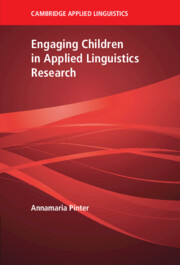Book contents
- Engaging Children in Applied Linguistics Research
- The Cambridge Applied Linguistics Series
- Engaging Children in Applied Linguistics Research
- Copyright page
- Contents
- Figures
- Tables
- Series Editors’ Preface
- 1 Setting the Scene
- 2 From Traditional to Contemporary Conceptions of Childhood
- 3 Voice, Agency and Participation
- 4 Child-Centredness and Democratic School Structures
- 5 Children’s Roles and Status in Applied Linguistics Research
- 6 Filling the Gap: What Kind of Research Is Needed?
- 7 Ethical Issues and Dilemmas
- 8 Towards Children’s Active Engagement in Applied Linguistics Research
- Appendix of Studies
- References
- Index
2 - From Traditional to Contemporary Conceptions of Childhood
Published online by Cambridge University Press: 05 October 2023
- Engaging Children in Applied Linguistics Research
- The Cambridge Applied Linguistics Series
- Engaging Children in Applied Linguistics Research
- Copyright page
- Contents
- Figures
- Tables
- Series Editors’ Preface
- 1 Setting the Scene
- 2 From Traditional to Contemporary Conceptions of Childhood
- 3 Voice, Agency and Participation
- 4 Child-Centredness and Democratic School Structures
- 5 Children’s Roles and Status in Applied Linguistics Research
- 6 Filling the Gap: What Kind of Research Is Needed?
- 7 Ethical Issues and Dilemmas
- 8 Towards Children’s Active Engagement in Applied Linguistics Research
- Appendix of Studies
- References
- Index
Summary
Chapter 2 provides a historical overview of childhoods and children, illustrating how the concept of childhood has developed over time. The discussion focusses on how adults working with children, including applied linguists, need to reflect on the implications of their belief systems and their conceptions of children and childhood. The chapter then elaborates on the most notable conceptions of childhood, including the universal view. It then introduces Childhood Studies, a multidisciplinary approach to studying children from bottom up. The UN Convention on the Rights of the Child (1989) and its proposal that children are rights-bearing citizens and their voices must be heard are introduced, and the discussion addresses how the proposed rights can be realised in practice by schools, communities and individual adult researchers. The main contributions of Childhood Studies over the last three and half decades are summarised to draw attention to some current issues and concerns. Finally, the chapter outlines the main components of the extended framework, which includes possibilities for conducting studies not just ‘on’ and ‘about’ but also ‘with’ and ‘by’ children.
Keywords
- Type
- Chapter
- Information
- Engaging Children in Applied Linguistics Research , pp. 18 - 41Publisher: Cambridge University PressPrint publication year: 2023



